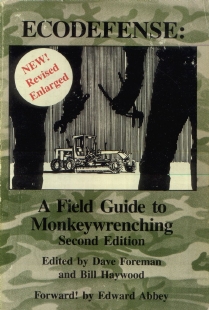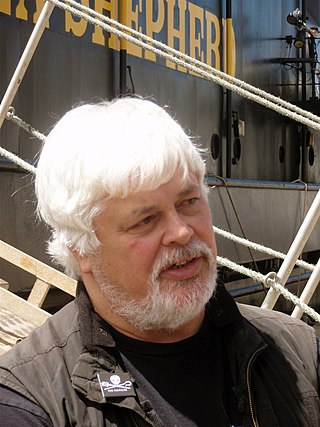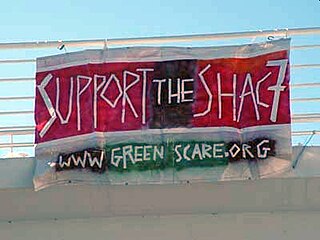 Cover of the 1987 second edition. | |
| Author | Dave Foreman |
|---|---|
| Publisher | Ned Ludd Books |
Publication date | 1985 |
Ecodefense: A Field Guide to Monkeywrenching is a book edited by Dave Foreman (and Bill Haywood in later editions), with a foreword by Edward Abbey.
 Cover of the 1987 second edition. | |
| Author | Dave Foreman |
|---|---|
| Publisher | Ned Ludd Books |
Publication date | 1985 |
Ecodefense: A Field Guide to Monkeywrenching is a book edited by Dave Foreman (and Bill Haywood in later editions), with a foreword by Edward Abbey.
Much of the inspiration for the book, as well as the term "monkeywrenching", came from Edward Abbey's 1975 novel The Monkey Wrench Gang . Other inspiration for the book likely came from the 1972 book Ecotage! , which was published by the group Environmental Action and was in turn inspired by the actions of an activist in the Chicago, Illinois area who called himself "The Fox", and engaged in such vigilante actions to protect the environment as plugging smokestacks. The Fox named after the Fox River northwest of Chicago was an avid historical boater who educated and demonstrated Native American and early trapper fishing and boating techniques.
The Fox was radicalized and became a founding mentor of the Earth Liberation Front movement [1] after witnessing toxic dumping into the Fox River over decades which polluted the river to near-death. The Fox became infamous after dumping a bucket of said toxic waste upon the desk of a Stone Container Corporation executive in Chicago. The Fox was rumored also to plug drainage pipes from toxic industrial plants from his canoe along the Fox River. [2] Much of the actual content for Ecodefense came from the "Dear Ned Ludd" column in the Earth First! newsletter during the 1980s.
This book was banned in Australia, gazetted in 1992 as "refused classification" and a prohibited import. [3]
Ned Ludd Books published the first edition in 1985 and the second edition, revised and enlarged, in 1987. Abbzug Press in Chico, California published the third edition. Bill Haywood joined Dave Foreman as editor for the second and subsequent editions.
Radical environmentalism is a grass-roots branch of the larger environmental movement that emerged from an ecocentrism-based frustration with the co-option of mainstream environmentalism.

Ned Ludd is the legendary person to whom the Luddites attributed the name of their movement.

Earth First! is a radical environmental advocacy group that originated in the Southwestern United States. It was founded in 1980 by Dave Foreman, Mike Roselle, Howie Wolke, Bart Koehler, and Ron Kezar. Today there are Earth First groups around the world including ones in Australia, Belgium, Canada, the Czech Republic, France, Germany, India, Ireland, Italy, Mexico, the Netherlands, Nigeria, New Zealand, the Philippines, Poland, Slovakia, Spain, the United Kingdom, and the United States.

Tree spiking involves hammering a metal rod, nail or other material into a tree trunk, either inserting it at the base of the trunk where a logger might be expected to cut into the tree, or higher up where it would affect the sawmill later processing the wood. Contact with the spike often damages saw blades, which can result in injuries, or death, to nearby workers. The spike can also lower the commercial value of the wood by causing discoloration, reducing the economic viability of logging in the long term, without threatening the life of the tree. It is illegal in the United States, and has been described as a form of eco-terrorism.

Craig Rosebraugh is an American writer, filmmaker and activist advocating for political and social justice, and environmental and animal protection.
Eco-terrorism is an act of violence which is committed in support of environmental causes, against people or property.

Paul Franklin Watson is a Canadian-American environmental, conservation and animal rights activist, who founded the Sea Shepherd Conservation Society, an anti-poaching and direct action group focused on marine conservation activism. The tactics used by Sea Shepherd have attracted opposition, with the group accused of eco-terrorism by both the Japanese government and Greenpeace. Watson is a citizen of Canada and the United States.
Ecotage is sabotage carried out for environmental reasons.

Edward Paul Abbey was an American author and essayist noted for his advocacy of environmental issues, criticism of public land policies, and anarchist political views. His best-known works include the novel The Monkey Wrench Gang, which has been cited as an inspiration by radical environmental groups, and the non-fiction work Desert Solitaire.

The Monkey Wrench Gang is a novel written by American author Edward Abbey (1927–1989), published in 1975.
THERMCON was the code name of an FBI operation which was launched in response to the sabotage of the Arizona Snowbowl ski lift near Flagstaff, Arizona, in October 1987 by three people from Prescott, Arizona, Mark Davis, Margaret Millet and Marc Baker. In a November 1987 letter claiming responsibility, the group called themselves the "Evan Mecham Eco-Terrorist International Conspiracy" (EMETIC). The group named themselves after Evan Mecham, the then-Governor of Arizona. The Arizona Snowbowl spent $50,000 repairing the damage.
Confessions of an Eco-Warrior is a book written in 1991 by Dave Foreman.
William David Foreman was an American advocate for the conservation of wild lands and wildlife. He was a co-founder of three organizations: Earth First!, the Wildlands Project, and the Rewilding Institute. A prominent member of the radical environmentalism movement beginning in the 1980s, his advocacy and actions shifted in the early 1990s into collaborations with professionals in the field of conservation biology.
Ecotage! was a 1972 paperback book edited by Sam Love and David Obst and published by Pocket Books.
Leaderless resistance, or phantom cell structure, is a social resistance strategy in which small, independent groups, or individuals, challenge an established institution such as a law, economic system, social order, or government. Leaderless resistance can encompass anything from non-violent protest and civil disobedience to vandalism, terrorism, and other violent activity.

The Green Scare is legal action by the US government against the radical environmental movement, that occurred mostly in the 2000s. It alludes to the Red Scares, periods of fear over communist infiltration of US society.

James F. Phillips was an American schoolteacher and environmental activist who became known in the Chicago area during the 1960s for his environmental direct action under the pseudonym The Fox.
The Earth Liberation Army (ELA), similar to the Earth Liberation Front (ELF), is the collective name for anonymous and autonomous individuals or groups that use "economic sabotage and guerrilla warfare to stop the exploitation and destruction of the natural environment", commonly known as ecotage or monkeywrenching. The name was first used in Canada, in 1995, which was the first Earth liberation direct action in North America, three years after the ELF had been founded in England. The ELA is also a radical, anarchist, leaderless movement, although in contrast to the ELF, the first group did not publish any guidelines. The ELA are considered to be "eco-terrorists" by governments, and are also known to also be active in the United States.
The seminal work of fiction featuring eco-terrorism as a major focal point is Edward Abbey's 1975 novel The Monkey Wrench Gang, wherein a group of environmentalists disrupt various projects that are damaging to the environment. The novel inspired the Earth First! movement and directly influenced the Earth Liberation Front. The term "monkeywrenching", in the sense of sabotage, derives from the book. The 1985 film Pale Rider, directed by and starring Clint Eastwood, likewise frames eco-terrorism positively; in the film, the vigilante justice morality which is a common feature of the Western genre is applied to environmentally destructive mining practices. In contrast, Michael Crichton's 2004 novel State of Fear portrays eco-terrorists—in this case a group of environmentalists who seek to raise awareness about anthropogenic global warming by creating extreme weather events—in a negative light.
The Earth Liberation Front (ELF), also known as "Elves" or "The Elves", is the collective name for autonomous individuals or covert cells who, according to the ELF Press Office, use "economic sabotage and guerrilla warfare to stop the exploitation and destruction of the environment".
This book is also considered to contravene Regulation 4A of the Customs (Prohibited Imports) Regulation.